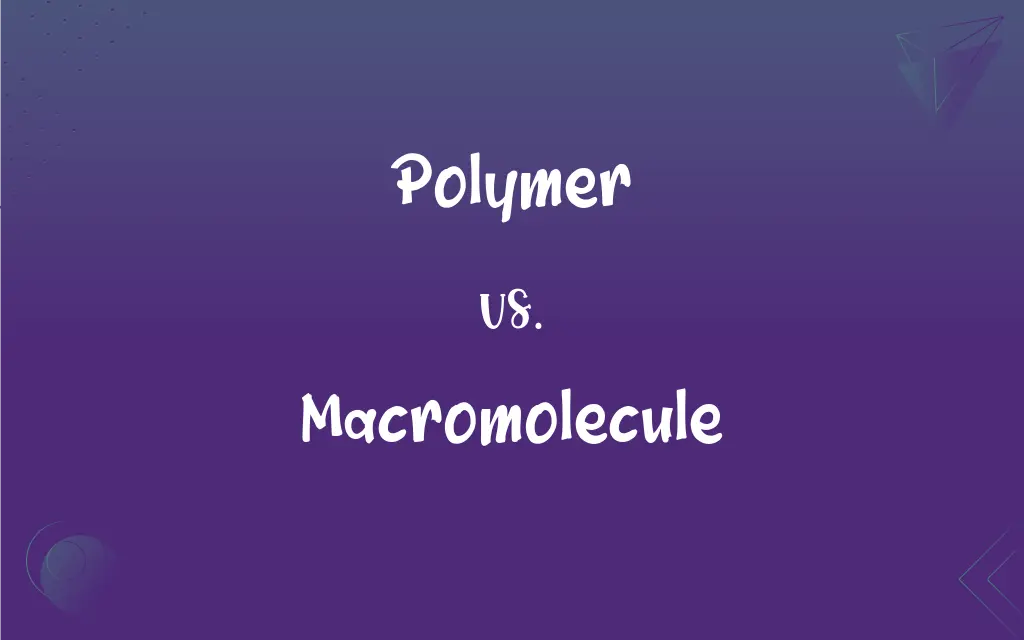Polymer vs. Macromolecule: What's the Difference?
Edited by Aimie Carlson || By Janet White || Published on December 27, 2023
A polymer is a substance composed of large molecules made from many repeated subunits, while a macromolecule is any large molecule, including polymers and others like proteins and nucleic acids.

Key Differences
A polymer is a chemical compound with molecules bonded together in long, repeating chains. These chains are formed from smaller units known as monomers. Macromolecules, on the other hand, are large molecules that can be polymers, but also include other large molecules like proteins, DNA, and RNA, which are not necessarily formed by repeating units.
Polymers are characterized by their chain-like structures, which confer unique physical properties like flexibility, elasticity, and strength. Macromolecules encompass a broader category, including both chain-like polymers and more complex structures like the double helix of DNA.
The synthesis of polymers involves chemical reactions that link monomers in a specific sequence, creating synthetic materials like plastics. Macromolecules, while they can be synthetic, also naturally occur in biological systems, playing vital roles in life processes.
Polymers can be natural, like cellulose in plants, or synthetic, like polyethylene in plastic bags. Macromolecules cover both these natural polymers and biologically essential molecules like lipids, which are not formed by repeating monomeric units.
In terms of applications, polymers are widely used in manufacturing, textiles, and technology. Macromolecules, particularly the non-polymeric types, are crucial in fields like biochemistry and molecular biology, providing insights into cell function and health.
ADVERTISEMENT
Comparison Chart
Definition
Large molecules from repeated subunits
Any large molecule, including polymers
Structure
Chain-like with repeating units
Includes both chains and complex structures
Types
Natural and synthetic polymers
Polymers, proteins, nucleic acids, lipids, etc.
Synthesis
Chemical reactions linking monomers
Chemical synthesis and natural formation
Applications
Manufacturing, textiles, technology
Biochemistry, molecular biology
ADVERTISEMENT
Polymer and Macromolecule Definitions
Polymer
Any of various chemical compounds made of smaller, identical molecules linked together.
Rubber is a polymer known for its elasticity and durability.
Macromolecule
A molecule containing a very large number of atoms, such as a protein, nucleic acid, or synthetic polymer.
DNA, a macromolecule, carries genetic information vital for life processes.
Polymer
A material formed by chemically bonding monomers into long chains.
Nylon, a synthetic polymer, is widely used in the textile industry.
Macromolecule
Any very large, complex molecule, usually composed of thousands of atoms.
Proteins, essential macromolecules, perform a vast array of functions in the body.
Polymer
Substance with large molecules composed of many repeated subunits.
Polyethylene, a common polymer, is used extensively in packaging materials.
Macromolecule
A high molecular weight molecule found in living organisms and synthetic materials.
Lipids, a type of macromolecule, are crucial in forming cell membranes.
Polymer
A substance with a molecular structure consisting chiefly or entirely of similar units bonded together.
Polystyrene is a versatile polymer used in insulation and plastic cutlery.
Macromolecule
A large molecule formed by the joining of smaller molecules, often in a polymer chain.
Starch, a macromolecule, serves as an energy storage in plants.
Polymer
Molecules characterized by their chain-like formation, consisting of repeating structural units.
Cellulose, a natural polymer, is a key structural component of plant cell walls.
Macromolecule
A molecule of high relative molecular mass, the structure of which essentially comprises the multiple repetition of units derived from molecules of low relative molecular mass.
Enzymes, macromolecules in nature, catalyze biochemical reactions in the body.
Polymer
Any of numerous natural and synthetic compounds of usually high molecular weight consisting of up to millions of repeated linked units, each a relatively light and simple molecule.
Macromolecule
A very large molecule, such as a polymer or protein, consisting of many smaller structural units linked together. Also called supermolecule.
Polymer
(organic chemistry) A long or larger molecule consisting of a chain or network of many repeating units, formed by chemically bonding together many identical or similar small molecules called monomers. A polymer is formed by polymerization, the joining of many monomer molecules.
Macromolecule
A very large molecule, especially used in reference to large biological polymers (e.g. nucleic acids and proteins).
Polymer
A material consisting of such polymer molecules.
Macromolecule
A very large molecule, especially a polymer having from hundreds to many thousands of atoms, such as DNA, RNA, protein, polysaccharide, polyethylene, polycarbonate, etc.
Polymer
Any one of two or more substances related to each other by polymerism; specifically, a substance produced from another substance by chemical polymerization.
Macromolecule
Any very large complex molecule; found only in plants and animals
Polymer
A naturally occurring or synthetic compound consisting of large molecules made up of a linked series of repeated simple monomers
FAQs
What is a polymer?
A substance with large molecules made of many repeating subunits.
What are examples of polymers?
Examples include plastics like polyethylene, and natural substances like cellulose.
Can polymers be naturally occurring?
Yes, like cellulose in plants and silk from silkworms.
Are all polymers flexible?
Many are, but properties vary widely based on structure and composition.
What roles do macromolecules play in biology?
They're essential for life, involved in structure, function, and regulation of body tissues.
Can macromolecules be synthetic?
Yes, synthetic polymers are a type of synthetic macromolecule.
Are macromolecules always polymers?
No, macromolecules include polymers and other complex molecules.
How are macromolecules analyzed in the lab?
Techniques like chromatography and mass spectrometry are used.
Are plastics always polymers?
Yes, plastics are a type of synthetic polymer.
What is biodegradable polymer?
Polymers that decompose naturally in the environment.
How are synthetic polymers made?
By chemically linking monomers in a process called polymerization.
What is a monomer?
A small molecule that can bond to others to form a polymer.
What is a macromolecule?
Any large molecule, including polymers and biological molecules like proteins.
Can macromolecules store energy?
Yes, like carbohydrates and lipids in living organisms.
What's the difference between polymers and macromolecules?
All polymers are macromolecules, but not all macromolecules are polymers.
How are proteins related to macromolecules?
Proteins are a type of natural macromolecule.
Are enzymes polymers?
Enzymes are proteins, so they are macromolecules but not polymers.
Is DNA a polymer or macromolecule?
DNA is a macromolecule and a polymer, composed of nucleotide monomers.
Can polymers conduct electricity?
Some, like conductive polymers, can conduct electricity.
Do macromolecules have a role in diseases?
Yes, abnormal function or structure of macromolecules can lead to diseases.
About Author
Written by
Janet WhiteJanet White has been an esteemed writer and blogger for Difference Wiki. Holding a Master's degree in Science and Medical Journalism from the prestigious Boston University, she has consistently demonstrated her expertise and passion for her field. When she's not immersed in her work, Janet relishes her time exercising, delving into a good book, and cherishing moments with friends and family.
Edited by
Aimie CarlsonAimie Carlson, holding a master's degree in English literature, is a fervent English language enthusiast. She lends her writing talents to Difference Wiki, a prominent website that specializes in comparisons, offering readers insightful analyses that both captivate and inform.






































































